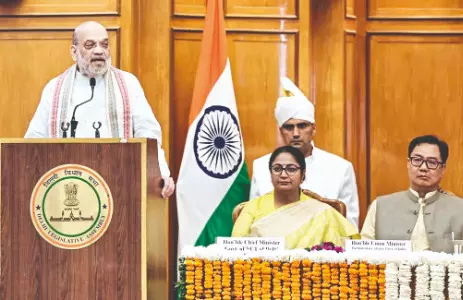Amit Shah: Don’t stall Parliament, Assemblies for political interests

New Delhi: The Delhi Legislative Assembly on Sunday hosted a landmark two-day All India Speakers’ Conference, inaugurated by Union Home Minister and Minister of Cooperation, Amit Shah, to commemorate the 100th anniversary of Vithalbhai Patel’s election as the first Indian President of the Central Legislative Assembly.
The inaugural ceremony witnessed the presence of Delhi Chief Minister Rekha Gupta, Lieutenant Governor V K Saxena, Delhi Assembly Speaker Vijender Gupta, Union Parliamentary Affairs Minister Kiren Rijiju, and several other dignitaries.
Speakers and Deputy Speakers from state and Union Territory Legislative Assemblies, along with Chairpersons and Vice-Chairpersons of Legislative Councils, attended the event. During the inauguration, Shah also visited a specially curated exhibition on the life and contributions of Vithalbhai Patel at the Delhi Assembly premises.
Addressing the gathering, Shah highlighted the historical significance of Patel’s election, stating, “Today marks the beginning of the nation’s legislative history. Vithalbhai Patel was elected as the Speaker of the Central Legislative Assembly, initiating the legislative history led by Indians.” He noted that eminent freedom fighters like Mahamana Madan Mohan Malviya, Gopal Krishna Gokhale, Lala Lajpat Rai, and Deshbandhu Chittaranjan Das contributed significantly to legislative debates during the freedom struggle.
The Home Minister emphasised the importance of legislative independence, remarking, “No legislative Assembly can function under the control of elected governments. The Assembly must remain independent to ensure the meaningfulness of debates held within it.” He urged the Speaker of the Delhi Legislative Assembly to compile the speeches delivered by all dignitaries in this historic House and make them available in the libraries of every Legislative Assembly across the country, so legislators and the youth can understand India’s democratic roots.
Shah further underlined the enduring legacy of Vithalbhai Patel, saying, “If anyone established the framework for running the country democratically based on Indian values, it was undoubtedly the valiant Vithalbhai Patel. He established numerous traditions that continue to guide us all, especially in legislative functions and the responsibilities of the Speaker.” Stressing healthy debate and the dangers of partisan disruptions, he added, “Preventing Parliament and Legislative Assemblies from functioning for political interests is not a debate. Symbolic protests have their place, but obstructing the House day after day requires reflection from the public and elected representatives.”
Shah also urged rethinking the use of protests to stall legislatures. He stressed, “Parliament and Assemblies shouldn’t be held hostage for political interests… symbolic protests are fine, but obstructing sessions harms democracy.”
Union Minister of Culture and Tourism, Gajendra Singh Shekhawat, addressed the first session, calling the Assembly a “living witness to the courage, sacrifice, and moral strength of leaders who faced immense challenges to ignite the flame of freedom across the nation. Every stone of the chamber bore the legacy of noble souls who contributed uniquely to India’s struggle for independence.”
The second session, themed “India – The Mother of Democracy,” was addressed by Deputy Chairman of the Rajya Sabha, Harivansh Narayan Singh, who traced India’s civilizational roots of democracy, saying, “Indian democracy was not imported from elsewhere, its roots lie deep within our own traditions, epics, and philosophies, where dharma and morality always guided power.”
Several state dignitaries, including Krishan Lal Middha, A.N. Shamseer, Raman Singh, Abdul Rahim Rather, Rahul Narewar, Vasudev Devani, Ram Shinde, and K.R. Ramakrishnam Raju, shared insights on legislative traditions and the evolving role of presiding officers.
Chief Minister Rekha Gupta called the event historic, stating, “Today is a historic day for Indian democracy. Vithalbhai Patel lit the flame of democracy a century ago. He enhanced the pride of all Indians by defeating the British nominee and envisioned an independent India where policies would be framed under its own Constitution and flag.”
She lauded exhibitions, documentaries, and commemorative stamps highlighting Patel’s legacy and emphasized recent Delhi Assembly initiatives such as solar energy, e-Vidhan, and e-filing. Concluding, she said, “Being a witness to this historic conference is a privilege for all. We must work together to deepen the roots of democracy and contribute to policy-making for the welfare of the people.”
The two-day conference combines historical reflection, legislative deliberations, and the promotion of democratic traditions, inspiring lawmakers and citizens alike.



